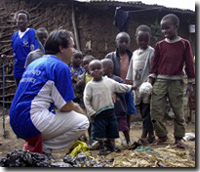
BRINQ is the home of entrepreneur and product designer Patrick Donohue, whose work focuses on high impact startups and products.
 By Patrick Donohue, August 2005
By Patrick Donohue, August 2005
"In Nairobi, stay away from the shanty towns, especially at night."
The door closes, Kibera opens, and East Africa's largest shantytown swallows us into the night. It's dark near Edwin's place, a sight sapping blackness that is darker with the knowledge of the trenches and trips that lie ahead, a misstep can send you rolling down make shift steps to soak in the flowing runoff, Kibera's sewage system. Edwin can see well enough in the dark and navigates the pitfalls without hesitation; I make a joke about mzungu eyes and then switch on my torch. I notice as we walk that the only other people using torches are the mzee, the old men or women. We walk through small alleys and walkways, passing row after row of mud houses with radios blaring, stray light seeping through cracks around the doors and below the roofs. I can't shake the feeling that I'm walking across somebody's front porch but I soon realize that's exactly what we're doing.
The passing people are dark African shadows; it's a surreal experience and I fancifully imagine that I can slip by without notice, achieving that anonymity I find impossible during the day. A mzungu in the dark, does he finally become a mtu, a person? To the young children I'm just a another mzungu, a white person, but the kids old enough to have seen kung-fu movies will shout out "Chinese", "Jackie Chan", or that distinctive "hi-ya" cry, matched with chopping hands and a comically fierce look. Onush, my colleague Erik's host, later tells me that the children are probably afraid of me, fearing that I'll open up some karate on them if they're not careful. My fleeting hopes that my sun-browning skin will help me escape notice are dashed when I learn that some older Kenyans think I might be Indian, the much maligned minority of Kenya, disliked because they're said to run all the businesses and pay Kenyans little. It's too hard to stop and explain that I represent the Vietnamese-Irish people, a difficult mixture to appreciate in a land where your tribe is supposed to explain so much about you. For all that I wear my winter hat - not so much for the cool night, which for the bundled-up Kenyans is a biting cold - no, I wear my winter hat to hide my hair, too long to ever be mistaken as Kenyan. I think it might be working, the children aren't shouting their mzungu bird call, their sing-song "how are you?", and there are no sudden looks; but perhaps the night just offers a different pace and people keep their notice to themselves. Edwin jokes that people are probably too surprised to say anything. What would a mzungu be doing in Kibera after dark?
* * *
[Download the full "Kibera Nights" (PDF) here]
The above is the beginning of a story I wrote almost a year ago, about the time I spent living and working in Kibera, a slum in Nairobi Kenya that is considered by some to be one of the world's most dangerous slums. I was there as part of the BoP Protocol pilot test in Kenya. Kibera is the slum that Fernando Meirelles' film the The Constant Gardner is set in and also was featured in Sarah McLachlan's video World on Fire. Enjoy!
- Patrick